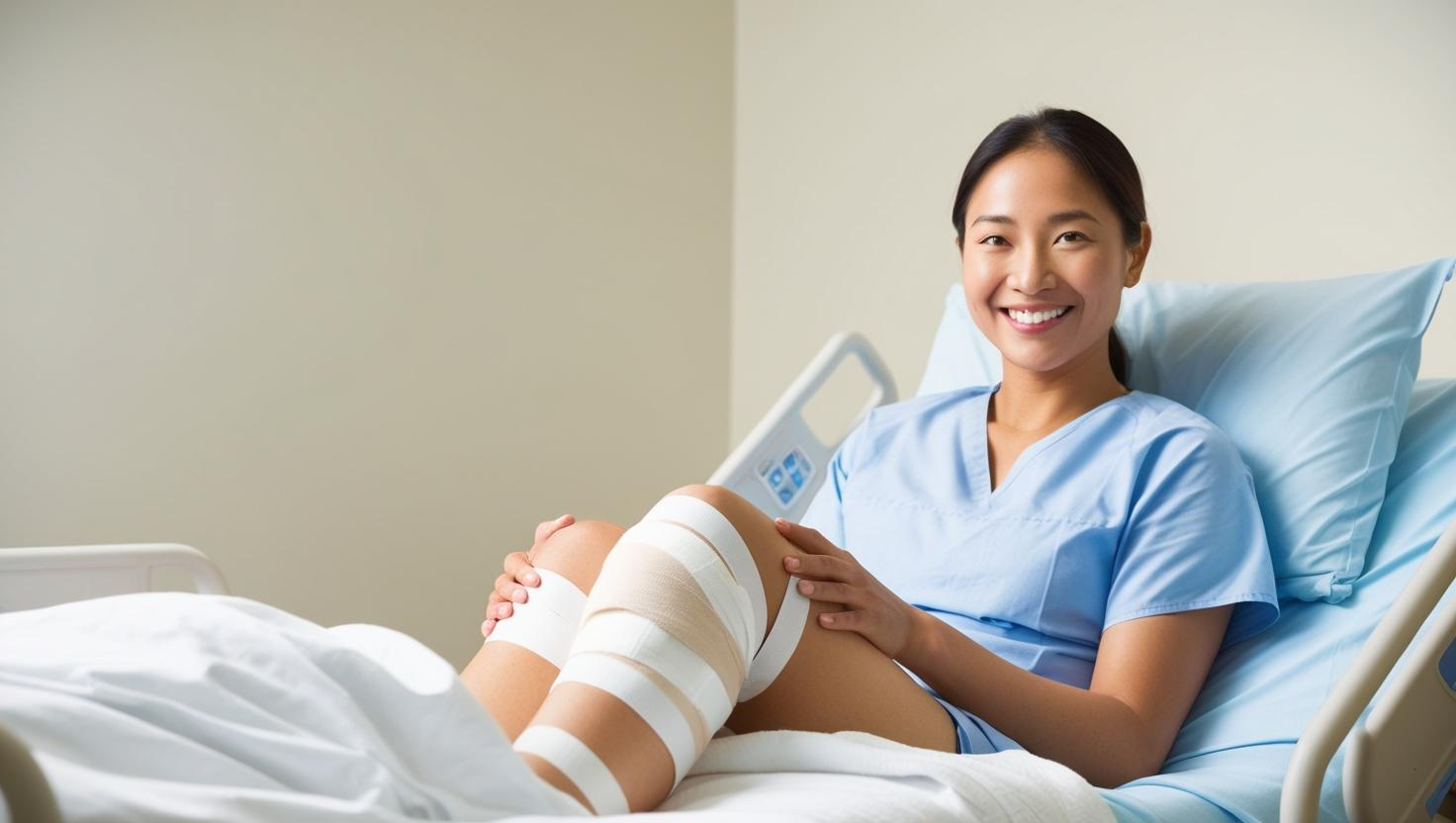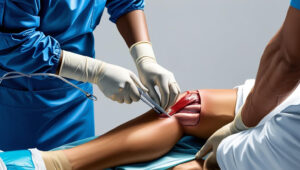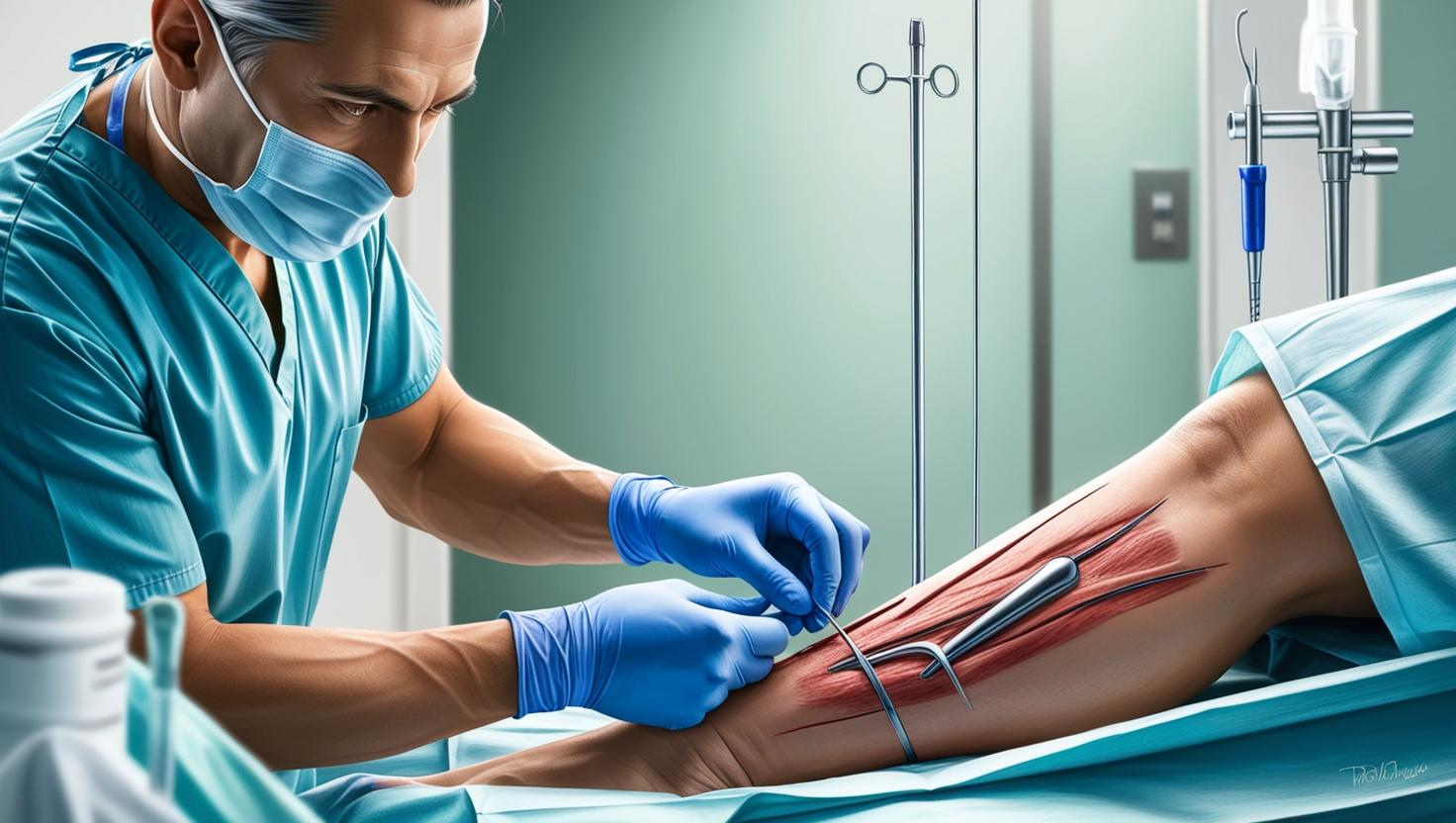Best Practices for Caring for Surgical Wounds: Essential Guidelines
- Blog
- Blog Detail
Best Practices for Caring for Surgical Wounds: A Comprehensive Guide

Mary Huntly APRN FNP-C
Proper care for surgical wounds is crucial for effective healing and preventing complications. In this guide, we’ll go over the best practices for caring for surgical wounds, including cleaning techniques, dressing changes, and infection monitoring. Follow these steps to support your recovery and avoid setbacks.
Key Takeaways
- Proper wound care, including cleaning and dressing changes, is essential for effective post-surgical healing.
- Nutrition and hydration play a pivotal role in optimizing recovery, with specific nutrients supporting tissue repair.
- Timely recognition of complications and regular follow-up appointments are vital for a smoother recovery process.
Essential Steps for Post-Surgical Wound Care

Proper wound care is the cornerstone of post-surgical recovery. The steps you take in the days and weeks following your surgery can significantly impact your healing process. From keeping the wound clean to monitoring for signs of infection, each step plays a vital role in ensuring that your wound heals correctly and without complications.
Adhering to the steps below helps support your body’s natural healing mechanisms, minimizes the risk of wound dehiscence, and enhances your overall recovery.
Cleaning the Wound Site
Keeping the surgical area clean and dry is paramount for preventing infection and promoting wound healing. Use gentle, unscented soap and water to clean the incision site, avoiding harsh substances like alcohol or peroxide, which can hinder the healing process. Covering the wound with a waterproof barrier during showers can help maintain dryness and protect the area from unnecessary exposure to water.
These precautions create a conducive healing environment and reduce the risk of complications. Remember, a clean wound site promotes better recovery.
Changing Dressings
Changing the wound dressings is essential for surgical wound care. Carefully remove the old dressing to avoid further injury. Clean your workspace, move pets away, and wash your hands thoroughly. Gather all needed supplies, including sterile dressings, clean cloths, and adhesive bandages.
Follow your healthcare provider’s instructions regarding the frequency of dressing changes, typically after showering. If you have any questions, don’t hesitate to consult your provider for guidance.
Monitoring for Infection
Monitoring for infection ensures proper healing post-surgery. Watch for signs like increased redness, swelling, or unusual discharge from the incision site. These symptoms may indicate an infection needing prompt medical attention.
By staying alert to these signs, you can seek timely medical intervention and prevent further complications. Remember, early detection is key to a successful recovery.
Bathing and Hygiene with Surgical Incisions
Maintaining proper hygiene is critical when you have a surgical incision. Adhering to your healthcare provider’s bathing instructions helps your wound heal correctly. Clean the skin around the wound with saline solution or mild soapy water to maintain hygiene without irritation.
Different surgeries result in varying incision sizes, which may influence the methods you use for hygiene and care. Poor surgical technique may also play a role in how you manage your recovery. Let’s delve into some specific techniques to help you stay clean and safe.
Safe Bathing Techniques
Safety should be your top priority when bathing after surgery. Using non-slip mats and grab bars in the bathroom can enhance safety and prevent falls. Additionally, avoid wearing tight clothing that could irritate the incision site during bathing.
Implementing these safety measures maintains hygiene without compromising the healing process.
Keeping the Wound Dry
Keeping the wound dry is crucial for preventing infection and ensuring proper healing after surgery. Patients can usually shower 24 hours after surgery, using mild soap and water to clean the incision. Cover the wound with a waterproof barrier during showers to keep it dry.
These practices help create an optimal environment for wound healing and reduce the risk of complications.
Using a Clean Towel
After bathing, it’s important to pat the area around the incision gently with a clean towel rather than rubbing. This method helps prevent irritation and keeps the wound dry without causing additional stress.
Using a clean towel each time prevents introducing bacteria to the wound site, promoting a healthy healing environment.
Nutrition and Healing
Nutrition plays a pivotal role in the wound healing process. Proper wound care complements good nutrition, as the body needs nutrients to repair tissues and fight infections. Delayed healing often results from poor nutrition or chronic illnesses hindering the body’s healing capabilities.
Explore the specific nutrients and dietary practices that support optimal wound healing.
Nutrients Needed for Healing
Proteins, vitamins, and minerals are crucial for healing. Protein, found in chicken, fish, beans, and dairy, aids tissue repair. Vitamin A is essential for skin cell production, while Vitamin C helps form new blood vessels.
Zinc also supports skin regeneration and is found in seafood, meat, nuts, and whole grains. Incorporating these nutrients into your diet can significantly enhance your healing progress.
Foods to Avoid
Certain foods promote healing, while others impede it. Foods high in sugar affect blood flow and immune response, hindering the healing process. Excess sugar intake can also break down collagen and elastin, vital for wound repair.
Avoiding these foods can help ensure that your body has the best environment for healing.
Hydration
Proper hydration is crucial for recovery, as inadequate fluid intake hinders the healing process. Staying hydrated ensures optimal blood flow, necessary for delivering nutrients to wounds.
Alcohol consumption can delay healing by reducing the body’s availability of essential vitamins and minerals. Prioritizing hydration can significantly improve your healing outcomes.
Activity and Movement Restrictions

Limiting physical activity post-surgery is crucial for preventing complications and ensuring proper healing. Heavy lifting and vigorous exercise should be avoided until your wound has sufficiently healed.
Adhering to specific activity restrictions helps avoid undue stress on your surgical site, promoting more effective healing.
Avoid Lifting Heavy Objects
Lifting heavy objects places significant strain on the body, which can lead to complications such as wound dehiscence. It’s recommended to avoid lifting heavy items for at least 5 to 8 days following surgery to reduce the risk of complications.
Adhering to this guideline can help you navigate the critical post-surgical period without setbacks.
Gentle Exercise
Light physical activities aid recovery by improving blood circulation without overexerting the surgical site. Low-impact activities like walking and stair climbing help maintain muscle strength and endurance.
Incorporating gentle exercise into your routine can support your healing process while avoiding complications.
Rest and Recovery
Adequate rest is vital for effective healing post-surgery. Sufficient rest in the weeks following surgery supports the healing process and helps prevent delays.
Prioritizing rest and pacing your activities can significantly enhance your recovery experience.
Recognizing Complications Early
Recognizing complications early is critical for effective wound management. Identifying signs such as increased redness, swelling, or unusual drainage from the incision can prompt timely medical intervention.
Staying vigilant helps prevent further complications and ensures a smoother recovery process.
Early Signs of Dehiscence
Signs of wound dehiscence symptoms include sudden pulling pain, gaps in wound edges, and visible holes. Recognizing early signs is crucial for effective wound management and preventing complications.
Immediate medical evaluation is crucial upon noticing signs of dehiscence to ensure proper care.
Other Complications
Untreated wound dehiscence can lead to infections and prolonged healing times, which may require further surgeries. Contact your surgeon if you experience fever, increased pain, or unusual changes at the incision site, as these may signal an infection.
Being aware of potential complications can help you seek timely medical attention and avoid severe complications.
When to Contact Your Surgeon
Timely communication with your healthcare provider can help manage complications effectively and promote healing. Symptoms of wound dehiscence, such as the wound appearing to reopen or separation of the edges, require immediate medical intervention.
Recognizing these symptoms and contacting your surgeon promptly ensures a smoother recovery.
Preventing Wound Dehiscence
Preventing wound dehiscence involves several strategies to support the healing process. Keeping the wound clean and protected significantly reduces the risk of dehiscence.
Let’s explore specific methods to prevent wound dehiscence and promote optimal healing.
Proper Wound Care
Proper wound care includes maintaining cleanliness and protecting the wound site. Supporting the surgical area when coughing or sneezing reduces stress on the incision.
By following these practices, you can create an environment conducive to healing and prevent complications.
Managing Chronic Conditions
Managing chronic diseases like diabetes is crucial for reducing complications in surgical recovery. Controlling blood sugar levels is essential, as high blood sugar impairs wound healing and increases infection risk.
Following your healthcare provider’s recommendations can help you manage your condition and promote healing.
Follow-Up Appointments
Regular follow-up appointments are vital for monitoring healing and quickly addressing any complications that arise. These visits allow healthcare providers to assess surgical sites, modify recovery plans if needed, and ensure that you are on the right track to recovery.
Attending these appointments allows you to catch potential issues early and receive the necessary care to support your healing journey.
Trinity Wound Care Services
Trinity Wound Care offers specialized services aimed at managing and treating surgical wounds. Utilizing advanced technology, including wound care membranes and grafts, Trinity Wound Care enhances recovery and optimizes resulting health outcomes for surgical patients.
Their comprehensive approach ensures that patients receive the best possible care tailored to their specific needs.
In-Home Treatment
Trinity Wound Care provides the convenience of in-home treatment, allowing patients to receive care without the need to visit a medical facility. This approach not only reduces the stress associated with travel and waiting times but also ensures personalized and continuous support throughout the healing journey.
Receiving wound care at home allows patients to recover in a comfortable environment, significantly enhancing the healing process.
Specialized Care for Traumatic Wounds
Expertise in traumatic wound management is crucial for preventing complications like infection and ensuring effective healing. Trinity Wound Care employs specialists trained to manage traumatic injuries and prevent complications such as surgical wound dehiscence.
By assessing factors like overall health, nutritional status, and underlying conditions, Trinity Wound Care provides comprehensive treatment plans tailored to each patient’s needs.
Contact Information
For those in need of specialized wound care services, Trinity Wound Care in Las Vegas, Nevada, is ready to help.
Contact us at 725-910-6633 for consultations and services.
Summary
Proper surgical wound care is essential for a smooth and successful recovery. By following the steps outlined in this guide, you can support your body’s natural healing processes, minimize the risk of complications, and ensure that your wound heals correctly. From cleaning and dressing changes to recognizing early signs of complications and maintaining proper nutrition, each aspect of wound care plays a vital role in your recovery journey.
Remember, professional wound care services like those offered by Trinity Wound Care can provide the specialized support you need to achieve optimal healing outcomes. By staying informed, vigilant, and proactive, you can navigate the post-surgical period with confidence and peace of mind.
Frequently Asked Questions
What are the key steps in post-surgical wound care?
Taking care of your post-surgical wound involves cleaning the site, changing dressings regularly, and keeping an eye out for any signs of infection. By following these steps, you can help ensure a smooth recovery!
How can I keep my wound dry while bathing?
To keep your wound dry while bathing, cover it with a waterproof barrier and gently pat the area dry with a clean towel afterwards. This simple step can help promote healing and keep you comfortable!
What nutrients are important for wound healing?
For effective wound healing, focus on proteins, vitamins A and C, and zinc, as they are vital for tissue repair and skin regeneration. Incorporating these nutrients into your diet can significantly boost your healing process!
When should I contact my surgeon about my wound?
You should definitely reach out to your surgeon if you notice any signs of infection, like increased redness, swelling, or unusual discharge. Staying proactive about your healing will help ensure a smooth recovery!
What services does Trinity Wound Care offer?
Trinity Wound Care provides specialized in-home treatment for traumatic wounds, utilizing advanced technology to significantly improve healing outcomes. You can feel confident knowing you’re in caring hands!
PERSONALIZED HEALTHCARE
Bringing Healthcare to Your Doorstep
Receive custom-tailored treatment plans that include initial care, ongoing follow-ups, and comprehensive treatment for underlying causes, delivered to you no matter where you reside.



About Us
Trinity Wound Care is dedicated to providing compassionate, comprehensive wound care and support services, ensuring every patient receives personalized treatment for optimal healing and well-being.
Quick Links
Contact Info
- (725) 205-2457
- admin@trinityhealthlv.com
- 6655 W. Sahara Ave D104, Las Vegas, NV 89146